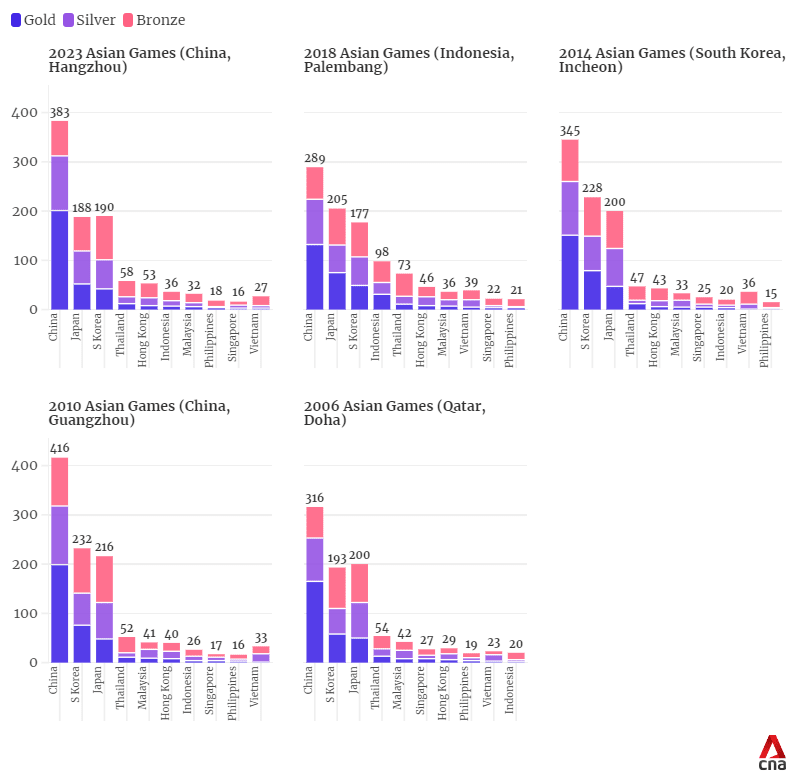Commentary: It’s time to redefine what success means for Singapore athletes at the Asian Games
Is the medal count an effective way to assess sporting success? SUSS sports professor Eugene Chew takes a deep dive into Singapore’s performance in the last five Asian Games.
.jpg?itok=mNoRr0rF)
Singapore's Shanti Pereira, Maximilian Maeder and Ryan Lo won gold at the 19th Asian Games in Hangzhou, China. (Photos: SportSG/Bryan Foo, Jeremy Lee)
SINGAPORE: The deafening cheers in the stadium, the fluttering of national flags and the glittering medals. At elite sports events such as the recently concluded Asian Games in Hangzhou, when an athlete wins a medal, it’s not just their victory; it’s the triumph of a nation as a whole.
Recall how Joseph Schooling was feted like a king after he won Singapore’s first gold medal at the Olympics in 2016. Recall too how Shanti Pereira was celebrated earlier this month after ending Singapore’s 49-year wait for an Asian Games gold medal in athletics.
It would not be a stretch to say that medals dominate the thoughts of many: After all, the numerical scorecard is a vivid indicator of a nation's success on the sports world stage. Each country’s rank or position on the medal tally table is determined first by the number of gold medals, followed by silver medals and then bronze medals. While gold medals are highly valued, every medal that athletes win counts.
When a sprinter lines up on the blocks, a badminton player steps onto a court, or a swimmer dives off the platform, they become ambassadors of their countries. Hence, at the individual level, it is inevitable that their performances are judged by the colour of the medal that they win or do not win. Besides, this is the nature of sports competitions; athletes compete to achieve a podium finish.
But is the medal count an effective way to assess sporting success? This question was raised as Singapore, with three gold, six silver and seven bronze medals, finished 20th out of the 45 nations that took part in the Asian Games this year.
Singapore's Shanti Pereira (women's 200m), Maximilian Maeder (men's formula kite) and Ryan Lo (men's ILCA 7) won gold. Team Singapore swimmers - who won six medals, including two golds, at the 2018 edition - managed only one silver in Hangzhou, courtesy of Teong Tzen Wei in the men’s 50m butterfly. They also attained nine fourth-place finishes.
HOW HAS SINGAPORE FARED IN THE LAST 5 ASIAN GAMES
From the international multi-sports competition perspective, the medal tally provides a clear and objective summary for the public to know how each country fared in the Games.
We can examine how Singapore performed this year compared to the past four Asian Games by focusing our attention on the medal count for the top three countries, the top six Southeast Asian countries, and Hong Kong, which has a population size that is closest to Singapore and with similar socioeconomic environment and strong emphasis on educational pursuit and excellence.
China has topped all five editions of the Games and is clearly the powerhouse in Asia with its high achievements in gold, silver, bronze and total medals. In terms of gold medals, South Korea ranked second, followed by Japan in third position in the 2006, 2010 and 2014 Asian Games. In the 2018 and 2023 Asian Games, Japan overtook South Korea. These three countries won the bulk of the available medals.

Thailand ranked first among the Southeast Asian countries except for the 2018 Asian Games held in Indonesia. The enormous difference in the medal count between the three top-ranked countries and those of the top six Southeast Asian countries clearly shows the wide gulf in elite sports performance between these countries.
Over the span of 17 years, Singapore hovered between third and, more recently, fifth position among the Southeast Asian countries and has moved from 12th to 20th position overall, indicating that other countries have advanced ahead of Singapore. We can also see that from 2010 onwards, Hong Kong has outperformed Singapore.
The medal count by sport also provides an understanding of how various Team Singapore sports have contributed to the medal tally at the Games. Over the five most recent Asian Games, gold medals came from sailing (13; at least one in every Asian Game), swimming (five; at least one in every Asian Game except 2023), bowling (three; in 2014, 2010 and 2006 ), athletics (one; in 2023), contract bridge (one; in 2018) and bodybuilding (one; in 2006).
The top five sports that contributed to the silver and bronze medal counts are: Sailing (nine silver, 12 bronze), bowling (seven silver, six bronze), swimming (five silver, seven bronze), table tennis (two silver, six bronze) and pencak silat (two silver, three bronze).
So, we see that sailing, swimming and bowling have been top contributors to Singapore’s medal count. Understandably, more podium finishes are expected from these three sports.
In the recently concluded 19th Asian Games, bowling was not part of the competition programme. While sailing won two gold, two silver and three bronze medals, swimming won only one silver medal and attracted unwanted public attention and queries.
Perhaps it is about accountability that the spotlight was on swimming. Swimming and sailing, under the purview of their respective National Sports Associations (NSA), are funded much more than other sports such as gymnastics, taekwondo or fencing.
Sport Singapore assesses NSAs on critical factors that are deemed to provide the conditions for achieving success at the major games – Southeast Asian (SEA) Games, Commonwealth Games, Asian Games, and Summer Olympic Games – and funds them accordingly based on the outcomes that they mutually agree on. These factors include leadership, governance, technical expertise, coaching system, and the use of sports science and medicine that enhance and improve sport performance.
MORE TO AN ATHLETE THAN JUST MEDALS
However, I would argue that at an individual athlete level, performance should not be measured by medals alone.
While medals accord recognition to the athlete, this can be inadequate for gauging their performance. More importantly, what matters is the athlete’s continual improvement and performance in relation to their training and competition plan.
For elite athletes, such plans are typically periodised based on a cycle of two to four years to enable the athletes to achieve peak performance at the right time. Other measures such as personal best, national record, individual ranking and split times can be used to evaluate an athlete’s performance and progress.
For example, whether the nine fourth-place finishes by the swimmers are considered successful can be evaluated based on their historical performances in terms of race time, split time and personal best, as well as the national record.
Also, for each specific event, measures such as race time and split (where applicable) achieved by Team Singapore swimmers can be compared against those of the event winners to understand how far off they are from them.
All NSAs should have data on the athletes’ performances in training and competitions. The public is not privy to such information. NSAs can manage public expectations of our athletes by providing crucial information about their progress and any conditions that may affect their performances. This must be done judiciously so that the athletes will not be adversely affected psychologically.
Knowing the athletes’ competitors and how they are performing is also helpful for the public to understand and have some sense of what to expect.
We should celebrate and recognise all sporting achievements, whether they are medals, national records, personal best, or significant improvements.
The local media, NSA, Sport Singapore and the Singapore National Olympic Council, can work together and find more ways to highlight them in various media and social media platforms. We should get behind our athletes, appreciate their hard work and urge them to press on to greater heights.
Associate Professor Eugene Chew is Head, Sports and Physical Education Programme, S R Nathan School of Human Development at the Singapore University of Social Sciences.



















